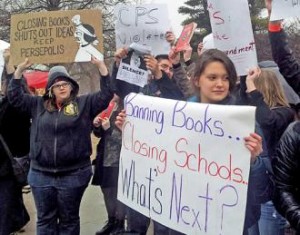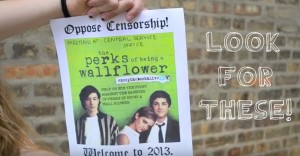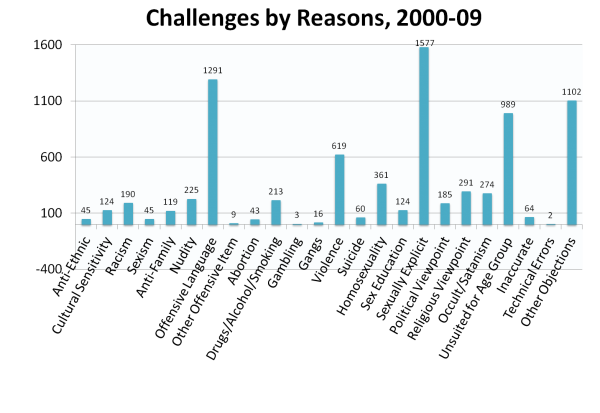Book Censorship in Schools: A Toolkit
Please note, newer and updated resources are available from the National Coalition Against Censorship, including:
- Book Censorship Action Kit
- Responding to Book Challenges: A Handbook for Educators
- Defend LGBTQ Stories: A Resource
The National Coalition Against Censorship (NCAC) is an alliance of more than 50 national non-profits, including literary, artistic, religious, educational, professional, labor and civil liberties groups. They have engaged in direct advocacy and education to support First Amendment principles. NCAC is unique in that they are national in scope, but often local in their approach, as they work with community members to resolve censorship controversies without the need for litigation.
"Banning books? That doesn't happen in the United States."
 Unfortunately, attempts at censorship doesn’t only happen in places like China or Iran.
Unfortunately, attempts at censorship doesn’t only happen in places like China or Iran.
Every year, there are dozens of challenges to literature as varied and acclaimed as The Absolutely True Diary of a Part-Time Indian by Sherman Alexie, John Steinbeck's Of Mice and Men, Persepolis by Marjane Satrapi and Toni Morrison's Beloved.
Whether you're a parent, a student, a teacher—or none of the above—you can fight back.
NCAC has been battling censors and book-banning advocates for over 40 years. We present this collection of materials on how to effectively fight challenges to books in schools for the use of students, educators, parents, and authors. This information is not intended as legal advice. If you are embroiled in a censorship controversy, we hope you will consult the resources below for guidance. Please also contact us and let us know if you, your school, or your community are facing a book challenge. We’re here to support you. Email us at [email protected]
Types of Objections to Books
So what makes people want to remove a book from a classroom or library? Often, objections arise from parents or other members of the community taking certain parts out of context from the whole. Literary and educational value is ignored. Religious grounds have long been cited as a reason for censoring books; parents, ministers, and religious figures often object to works that discuss sex, evolution, witchcraft, or occult themes.
This chart of book challenges, courtesy of the American Library Association, provides a sense of what provokes the most controversy:
Profanity
Books are often challenged for the language they contain, even though profanity is often used in literature to convey social or historical context, local dialect, or simply to better depict reactions to real-life situations. Books such as Of Mice and Men by John Steinbeck and Slaughterhouse-Five by Kurt Vonnegut have been challenged or censored due to objections to profanity.
Sex and Sexuality
Books as varied as Judy Blume’s Forever, Vladimir Nabokov’s Lolita, and even Anne Frank’s The Diary of a Young Girl, among many others, have been challenged by parents and school boards who deem certain sexual passages inappropriate for young people. Children’s literature like It’s Perfectly Normal by Robie Harris, and Leslea Newman’s Heather Has Two Mommies face demands for removal for their frank discussion about sexual health or focus on LGBT issues.
Violence
Objections to violent content are often based on the idea that these works trivialize violence of desensitize readers to its effects. Books challenged on these grounds include One Fat Summer by Robert Lypsyte and Native Son by Richard Wright.
Race
Books containing racial epithets or historical truths regarding their usage regularly come under fire. Race is often cited in challenges to Mark Twain’s Huckleberry Finn and Sherman Alexie’s Absolutely True Diary of a Part-Time Indian.
When Books are Challenged What Can a School Do?
Schools and school boards should be prepared to face challenges from parents and others in the community by creating a sound policy to handle such controversies.
It is advisable for policies to contain a statement supporting intellectual and academic freedom, and an explanation of the importance of exposing students to a wide variety of material and information, some of which may be considered "controversial."
Policies should also clearly indicate that certain kinds of objections do not provide a legally permissible ground for removal, exclusion or restriction.
Disagreement with a specific idea or message, and personal objections to materials on religious, political or social grounds, are the most common grounds for challenges—and are also the most suspect. Such concerns may justify a parent's request that his or her child be assigned alternate material, and many school policies provide this as an alternative to removing a book for an entire class.
But such personal viewpoint-based concerns, standing alone, rarely justify the removal of a book or other material—and may raise First Amendment issues. To be sure, if strong feelings about a given text are shared more widely, this may instead suggest the need for teachers and school officials to better explain the educational value of the material and ways in which any perceived harms can be alleviated, perhaps through inclusion of additional materials or guided classroom discussion.
So what happens if a parent files a formal objection to a book? A school’s policy should include the utilization of a committee—often composed of instructional staff, library staff, and administrators, and occasionally students and parents—to review complaints with an eye towards the pedagogical value of the work in question. The committee's recommendation is sometimes subject to review should a complainant file an appeal, but the judgment of such a committee is entitled to deference if grounded in sound educational principles. Its decision should only be reversed for compelling educational reasons.
Materials should never be removed unless the complaint procedures are followed, and materials should never be removed prior to the completion of the complaint process. Unfortunately, many schools that have adequate policies for dealing with book challenges fail to follow their own procedures.
In Waterloo, IA, administrators removed The Absolutely True Diary of a Part-Time Indian from the curriculum in a gut-reaction following one parent's complaint, despite the fact that the district has strict review policies. In the end, after letters and protests from parents, teachers and organizations like NCAC, superintendent merely shrugged her shoulders and said, "It's done."
In general, schools should ensure that the following principles are followed when a person files a complaint:
- Complaints must be made in writing;
- Complainants should identify themselves both by name/address, and by their interest in the material (i.e., as a parent, student, religious leader, etc.)
- Complainants must have read/seen the entire work to which (s)he objects;
- The complaint must be specific about the reasons for the objection (i.e. calls upon a broader knowledge or range of experience than students typically possess);
- Complaints should request a specific remedy (i.e., an alternative assignment for an individual, or removal/exclusion affecting the entire school community);
- Complaints, standing alone, should never provide grounds for disciplining teachers or librarians.
Take Action! How to Respond to Challenges
So let's say a formal book challenge has been filed. What can you do to protect the freedom to read?
For Everyone
Contact NCAC to let us know there's a problem. We're here to support you.
For Teachers and School Officials
Be prepared.
Teachers and educators should be familiar with the school's policies and procedures for dealing with book challenges and should be prepared to follow them.
Convey key messages about school curricula.
If responding to a challenge, focus on three key points:
- School curricula reflect a spectrum of social and political views and experiences;
- School curricula are chosen by professional educators familiar with students' educational needs and abilities;
- In many cases, parents' concerns can be addressed by requesting an alternative assignment. While this is an attractive option, alternative assignment policies can be abused to the point of wreaking havoc upon the curriculum, which cannot be tailored to every student.
Respond to complaints.
- Encourage parents to raise any concerns they may have about their children’s education;
- Explain the three key points listed above;
- Be prepared to articulate the educational rationale for reading the book in question;
- Be prepared to discuss the school’s policies and procedures for challenging books, and provide forms or written instructions.
Spread the word
- Notify parents, students, colleagues, and other interested parties if a formal complaint process is initiated.
 In 2013, after the Glen Ellyn, IL, school district restricted Steven Chbosky's The Perks of Being a Wallflower in middle school libraries, students, parents, teachers and citizens activated on social media, creating a video and rallying the community by utilizing the hashtag #keepthebookalive. The book was restored following this effective grassroots effort.
In 2013, after the Glen Ellyn, IL, school district restricted Steven Chbosky's The Perks of Being a Wallflower in middle school libraries, students, parents, teachers and citizens activated on social media, creating a video and rallying the community by utilizing the hashtag #keepthebookalive. The book was restored following this effective grassroots effort.
- Tell your friends and neighbors in the community to join with you in speaking out.
In Tallahasse, FL, students put up flyers around the school calling attention to the definition of censorship after the school's principal's knee-jerk reaction to parental complaints about the summer reading assignment of The Curious Incident of the Dog in the Night-Time.
- Make sure that local media outlets are aware of the book challenge.
- Write letters to the editor of your local newspaper.
For Authors
You can play a critical role in the fight against censorship.
Contact your publisher.
- Let them know where your book is being challenged, and on what grounds.
Write letters.
- Write to the school principal, superintendent and school board about your book. If possible, try to contact the challenger directly to discuss your book. See the sample letter at the end of this toolkit.
Speak Out and Spread the Word.
- Post a statement on your website or blog opposing censorship. Use social media to alert readers to the challenge against your book. Provide contact information for the school board, and encourage readers to urge school officials to retain the book.
- Submit a letter to the editor or an opinion piece to the local newspaper of the town or county in which your book is being challenged.
- In libraries, schools, bookstores, and at conferences, share your experiences with others, and speak out in support of the freedom to read.
Sample Letter
Dear ____________ ,
I am writing to express concern about efforts to remove [book title] from the [course name and/or grade level] curriculum at [school name]. I understand that the book has been challenged because of objections to __________________.
I strongly urge you to keep this book in the curriculum at [school name] and to uphold the freedom to read for all students in our community. The views of those seeking removal of the book are not shared by all. The challengers have no right to impose their views on others or demand that the educational program reflect their personal preferences.
If parents do not want their children to read a particular book, then they are free to request an alternative assignment. But they may not infringe upon the rights of others to read the book or to tell other parents what their children may read in school.
Furthermore, removing the book will only teach children to remain silent instead of asking questions for fear of addressing "offensive" or "inappropriate" topics. They will learn that the way to deal with difficult speech is to avoid it, and that fear and ignorance supersede the quest for knowledge. Reading is the safest way for kids to learn about the world in which they are growing up, and doing so in a classroom setting, with guided discussion, will only help them anticipate real-life problems.
I therefore urge you to ensure that [district name] policies are followed and that [book title] [remains in/is restored to] the [school name] [course name and/or grade level] curriculum.
[your name]
Resources
The National Coalition Against Censorship (NCAC)
Founded in 1974, NCAC is an alliance of more than 50 national non-profit organizations, including literary, artistic, religious, educational, professional, labor and civil liberties groups, united in their support of freedom of thought, inquiry and expression. NCAC works with teachers, educators, writers, artists, and others around the country dealing with censorship debates in their own communities. It educates its members and the public at large about the dangers of censorship, and it advances policies that promote and protect freedom of expression and democratic values. NCAC’s Kids' Right to Read Project (KRRP), a key initiative of its Youth Free Expression Program, is a unique advocacy project that works at the grassroots level to protect students' right to read in schools, libraries, and bookstores across the country.
The National Council of Teachers of English (NCTE)
The NCTE supports intellectual freedom at all educational levels. An 80,000-member organization devoted to improving the teaching and learning of English and faced with challenges to teaching materials or methods, the NCTE offers support, advice and resources to teachers and schools faced with challenges to teaching materials or methods. The NCTE has developed a Statement on Censorship and Professional Guidelines in recognition that English and language arts teachers face daily decisions about teaching materials and methods.
The American Library Association Office for Intellectual Freedom (ALA-OIF)
Established in 1967, the Office for Intellectual Freedom is charged with implementing ALA policies concerning the concept of intellectual freedom as embodied in the Library Bill of Rights, the Association's basic policy on free access to libraries and library materials. The goal of the office is to educate librarians and the general public about the nature and importance of intellectual freedom in libraries.
The American Booksellers for Free Expression (ABFE)
ABFE is the bookseller's voice in the fight against censorship. Founded by the American Booksellers Association in 1990, ABFE's mission is to promote and protect the free exchange of ideas, particularly those contained in books, by opposing restrictions on the freedom of speech; issuing statements on significant free expression controversies; participating in legal cases involving First Amendment rights; collaborating with other groups with an interest in free speech; and providing education about the importance of free expression to booksellers, other members of the book industry, politicians, the press and the public.
This work is licensed under a Creative Commons Attribution 3.0 United States License

